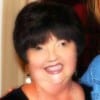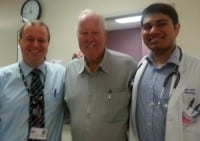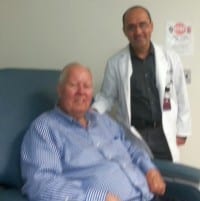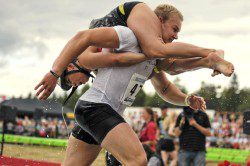 By Brenda Cannon Henley
By Brenda Cannon Henley
I enjoy a good western story whether it is a novel, a short writing in a magazine, a movie made for TV, or a series done well. Who can forget Lonesome Dove and The Return to Lonesome Dove? Any Texan worth his salt knows the scenes in his or her mind and cannot wait until Gus or Cal, or the lovely Miss Claire, or any of our favorite characters does something heroic or perhaps just quite human. The scenery is usually enticing, the action swift and the endings anticipated, but enjoyed, nonetheless. My favorite part of most of the westerns I have loved is when the good guys are in real trouble and the bugle sounds, dust is seen on the horizon, one can hear the sound of horse hoofs, and the United States Cavalry rides into view to save the day.
In my last two columns, I detailed my husband’s recent battle with a very serious cancer that has engulfed his esophagus and most of his stomach and had eaten through the walls of each organ before we even knew he had the dread disease. The doctor that first examined him told me up front that it was a very bad cancer and that it probably was already in the lymph nodes as well. You may ask why I am dwelling on this subject so much and giving valuable space to this issue. I am not a physician, have had no medical training, unless you count what I have dug out for myself during these weeks, or what the medical team has taught me. I have never even played one on television, but I have learned and learned well. If this space can be used to get one or two folks to go and get that needed scan sooner, rather than later, then it will be worth the effort ten fold.
Ted, a healthy man by all appearances, was diagnosed on February 18. He was admitted to the hospital and for four days, the medical team reversed the effects of a blood thinner he had been on for 18 months for Afib. He then underwent several major tests in an effort to determine what the best plan of treatment would be for him. When you hear the word, “cancer” directed at you, things change. The original physician was correct. It was a bad cancer, and one that had eaten its way through the walls of both the esophagus and stomach, was growing outside those walls in the cavity, and appeared to be in three lymph nodes. We were very frightened because of all we learned in the next few days. We have faith and trusted that God was taking care of us, but yet, human nature caused us to wonder about a lot of things. Family and friends were wonderful. They had stories by the dozen, advice by the pound, and suggestions that we should follow — all made in love and concern.
The first thing I learned is that one must make his or her own important decisions. I did my best to defer to Ted. It was his body. He is an educated and kind man. I wanted him to call the shots and I honestly did not want the heavy responsibility of leaning too much in either direction because I was then, and am not now, certain of the outcome. Many wanted us to move immediately to M D Anderson Cancer Center in Houston, but we really saw no need, and especially so, when we discovered that M D Anderson was actually started out of the University of Texas Medical System. UTMB in Galveston is the oldest and one of the most respected medical institutions in the big state of Texas and around the world for that matter. We did our homework and found that the doctors, teaching staff, and nursing professionals were well educated, on the cutting edge of medical research, and genuine in their approach to Ted’s care.
We were sent home to make our plans. After a few days, we returned to for doctors’ appointments and to have a clearer understanding of exactly what was going on in Ted’s body. He was feeling normal for the most part and it was difficult for me to see that he was so very sick on the inside while looking so right on the outside, but I had lots to learn.
My first feelings were those of being overwhelmed. Cancer, “the big C,” interrupted my well-ordered life, it changed my plans, and it kept me from my work and my fun, and yes, I resented it greatly. I remember thinking, like most people do, “This shouldn’t happen to my husband. He is a good man.” And as much as people loved us, I felt alone. This was our battle.

Dr. Todd Alan Swanson, Ted Henley, and Dr. Waqar Haque, radiation therapy chief resident following a radiation treatment at UTMB.
The day I really knew in my heart he was our man was when Robertson secretly told me that he had been sent to anger management twice because he was so vocal about the best care for his patients. Everyone we talked to from the parking lot attendants, to the information clerks, nurses, former patients, and other doctors, said of Dr. Swanson, “He really cares about his patients and he fights for them all the way.” I knew I liked him and could put my trust in his work. He has remained with us throughout this journey and has never been too busy or too important to answer our questions.

Ted Henley and Dr. Mohsen Ghadimi-Mahani during one of Ted’s chemotherapy treatments at UTMB.
Each of the nurses, technicians, and office staff went out of their way to help both Ted and myself and to give encouragement or sometimes, just the listening ear. It has been a new path for us to walk and we have both learned so much.
I am dwelling on the men and women who have helped Ted to point out that when someone is diagnosed with a terrible disease, such as cancer, the medical team you choose can make all of the difference in the world — Choose well, take as much time as you need within reason, check out the backgrounds, talk to former patients, and listen to your own heart. Somehow, you will have insight when the time comes. I cannot imagine being under the care of any person who simply thought Ted was a number or a case. We love our medical team at UTMB and wish them all of the success in the world in their future care of patients. May God bless these strong men and women who labor more than we can know to save and enrich lives.
Brenda Cannon Henley can be reached at (409) 781-8788 or at [email protected].
Contact Brenda Cannon Henley:
[contact-form-7 404 "Not Found"]

 Posted in
Posted in 























